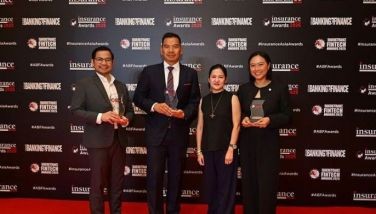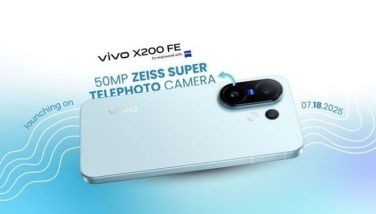ADB releases $100M for power sector
December 19, 2001 | 12:00am
The Asian Development Bank (ADB) finally released yesterday $100 million for the power sector under a $300-million loan for the country’s power sector. The entire package is $600-million, with a counterpart fund of $300-million provided by the Japan Bank for International Cooperation (JBIC) as co-financier.
The Department of Finance (DOF) is the Philippine government agency designated as executive entity for the program loan.
The $100 million released yesterday is the second tranche from the A DB. It will be matched by the JBIC. However, JBIC still has to receive the formal proposal of the Philippine government for the release of their counterpart fund.
"We are waiting for the documents from the Philippine government which is essentially the same documents it submitted to the ADB," an unnamed JBIC official said.
The first tranche amounting to $200 million was released when the loan agreement was signed way back in 1998. The third tranche, amounting to another $200 million, has not been scheduled for release.
According to ADB director for Philippine office Dr. Gunther Hecker, the release of the second tranche was triggered by the substantial completion of conditions set by the bank.
Among these conditions are the passage of the Electricity Industry Reform Act, privatization of the power sector, unbundling of power rates, and a commitment of transparency by the Philippine government to the sector’s creditors.
Aside from the power loan, the ADB has released a total of $110 million this year – $35 million for various development projects in Mindanao and $75 million for the non-bank financial sector or the capital markets.
The projects for Mindanao are meant to benefit the educational sector, basic urban services, and community resource management.
The $75-million non-bank financial governance program loan aims to increase the efficiency of financial markets and strengthen capital market regulatory institutions. Attached to the program loan is a $1-million advisory grant to strengthen regulatory and market governance.
The loan will have a 15-year term with a grace period of three years under its LIBOR-based lending facility. The loan requires a commitment fee of 0.75 percent per annum, a frontend fee of one percent, and plus conversion options.
The DOF will be the executing agency, and the loan closing date was set in December 2002. The Securities and Exchange Commission (SEC) will be the implementing agency.
However, Hecker lamented that the 2001 total loans released were way below the programmed average disbursements of nearly $300 million annually. The ADB approved a $1.1-billion loan covering the period of 2001 to 2004 focused mainly on social sector programs, the energy sector, and Mindanao.
"That means we have to double up in the following years to meet our four-year disbursement deadlines," he added.
The Philippines received ADB loan disbursements of $228.0 million last year. But the disbursement ratio was only 11.3 percent, which is lower than the 20.5 percent ADB-wide average.
Since 1966, the ADB extended a total of $4.9 billion to the Philippines covering 183 loans of which 60 were active at the end of 2000.
The ADB said Philippine disbursement record was among the worst in the region up to 2000. "The 2001 disbursements and availments were better (than last year)," Hecker said.
The Department of Finance (DOF) is the Philippine government agency designated as executive entity for the program loan.
The $100 million released yesterday is the second tranche from the A DB. It will be matched by the JBIC. However, JBIC still has to receive the formal proposal of the Philippine government for the release of their counterpart fund.
"We are waiting for the documents from the Philippine government which is essentially the same documents it submitted to the ADB," an unnamed JBIC official said.
The first tranche amounting to $200 million was released when the loan agreement was signed way back in 1998. The third tranche, amounting to another $200 million, has not been scheduled for release.
According to ADB director for Philippine office Dr. Gunther Hecker, the release of the second tranche was triggered by the substantial completion of conditions set by the bank.
Among these conditions are the passage of the Electricity Industry Reform Act, privatization of the power sector, unbundling of power rates, and a commitment of transparency by the Philippine government to the sector’s creditors.
Aside from the power loan, the ADB has released a total of $110 million this year – $35 million for various development projects in Mindanao and $75 million for the non-bank financial sector or the capital markets.
The projects for Mindanao are meant to benefit the educational sector, basic urban services, and community resource management.
The $75-million non-bank financial governance program loan aims to increase the efficiency of financial markets and strengthen capital market regulatory institutions. Attached to the program loan is a $1-million advisory grant to strengthen regulatory and market governance.
The loan will have a 15-year term with a grace period of three years under its LIBOR-based lending facility. The loan requires a commitment fee of 0.75 percent per annum, a frontend fee of one percent, and plus conversion options.
The DOF will be the executing agency, and the loan closing date was set in December 2002. The Securities and Exchange Commission (SEC) will be the implementing agency.
However, Hecker lamented that the 2001 total loans released were way below the programmed average disbursements of nearly $300 million annually. The ADB approved a $1.1-billion loan covering the period of 2001 to 2004 focused mainly on social sector programs, the energy sector, and Mindanao.
"That means we have to double up in the following years to meet our four-year disbursement deadlines," he added.
The Philippines received ADB loan disbursements of $228.0 million last year. But the disbursement ratio was only 11.3 percent, which is lower than the 20.5 percent ADB-wide average.
Since 1966, the ADB extended a total of $4.9 billion to the Philippines covering 183 loans of which 60 were active at the end of 2000.
The ADB said Philippine disbursement record was among the worst in the region up to 2000. "The 2001 disbursements and availments were better (than last year)," Hecker said.
BrandSpace Articles
<
>
- Latest
- Trending
Trending
Latest
Trending
Latest
Recommended




























